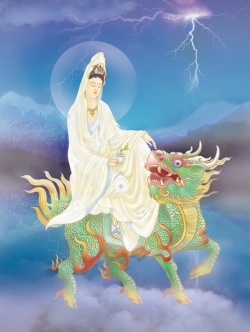How the personal mandala, basically o...
Summary: How the personal mandala, basically our innate Buddha Nature, differs from the ego mandala; the use of the words ego and self, and looking at whether the word 'I' can be used in a true, meaningful way.
A student writes:
"What is the exact difference between 'personal mandala' and 'ego mandala,' as used in Section A. ('Mandala Principle and our Personal Mandala')? Why make the distinction between a personal mandala being 'a reality we misconstrue' and the ego mandala being 'based on a complete fabrication?'"
Shenpen replies:
The personal mandala is basically our Buddha Nature, there from the beginning, even when the ego mandala is misconstruing it and creating an illusory world for itself. The world the ego mandala creates does indeed relate to the structure and qualities of the personal mandala, but with the added distortion that obscures its true nature. The fabrication the ego mandala is based on is the idea that the self is something other than the fully operative Buddha Nature. It is all an unnecessary fabrication ... completely ... it is not in the slightest bit necessary and never was. The personal mandala operates much better without it.
The personal mandala is not really affected by the ego mandala except in as far as it experiences dukkha, the dukkha of wanting to get back to its original state. But of course that implies that it is affected by the delusion. So it is not possible to talk about this in an entirely consistent way. This is the point that Queen Shrimala makes in her 'Lion's Roar Sutra.' How it becomes obscured while never being affected by the kleshas is inconceivable. Its unobscured nature is also inconceivable. These are the two great mysteries.
The point I am emphasising is that our personal mandala is basically good. The ego mandala is an unnecessary addition that can be dropped, leaving us operating better than before, vastly better when the process is complete, since we are in essence the three Kayas of the Buddha. That is what our personal mandala is.
Even though our experience of it is distorted, we have access to its qualities already. They shine through our confusion and are what lead us out of it. We need to learn to be subtle about recognising what are the Buddha qualities and trusting them, and what is ego grasping and letting that go. While we are still only on the path, it's not easy to distinguish between them. We are in constant danger of throwing the baby out with the bath water or making unnecessary efforts, or lacking confidence, where there is no need to feel so alienated and lost.
The word ego is a very confusing term and one could argue that it is best to leave it out of the discussion here entirely. One could use the term ignorance mandala or mandala of confusion to equally good effect. I use 'ego mandala' because ego is used so much when talking about self and many Buddhist writers and even translators hardly distinguish between the two, which I think is a big mistake. Self in English has more or less the same range of usage as atman in Sanskrit and has a significantly different range of usage to the word ego.
Because of this, many Western Buddhist teachers now are beginning to talk about the need to build up a healthy ego, because many Westerners took the not-self doctrine to mean that they should somehow disappear in a puff of smoke. This then often melded in a person with psychological problems into a sense that the path to Awakening meant they should let others walk all over them. I run into this kind of thinking frequently when I am teaching.
Instead of saying that we need to build up a healthy ego, I have avoided the psychological use of the term altogether by using the term personal mandala. Just because it is 'me' doesn't mean it is necessarily deluded or grasping. Even the Enlightened Buddha talked about himself as 'me.' It is not a problem at all. The problem is in the grasping at what is false and that is the heart of the mandala based on avidya (ignorance), which I am calling the ego mandala.
I am using ego in the ordinary way we talk about our pride and selfishness as ego. But maybe to use the term at all is misleading and suggests that I am using some kind of psychological jargon.
The question of whether with non-dual awareness there is a sense of 'I' is an important question. I am happy to use 'I' for what I essentially am, just as the Buddha said 'I am the foremost in the World,' 'I am the Awakened One.' This use of language is not a problem. How else could he have made his point? On the other hand, something had clearly dropped away on the night of his Enlightenment. So, yes, I would say the ego-mandala dropped away and what Awoke was the Buddha Nature, speaking in the Buddha's words, 'I am Awakened.'
Editor's note:Reference is to Coursebook Four of Discovering the Heart of Buddhism, Part 2: Mandala Principle, Section A: Mandala Principle and our Personal Mandala.
Sanskrit terms: Dukka, suffering; klesha, mental defilement; kaya, body; avidya, ignorance.

